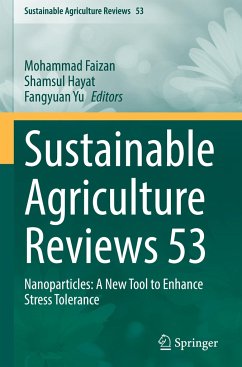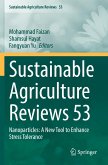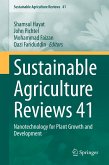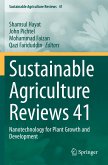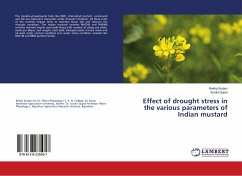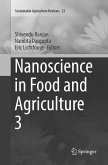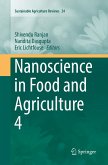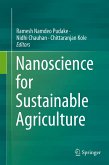Sustainable Agriculture Reviews 53
Nanoparticles: A New Tool to Enhance Stress Tolerance
Herausgegeben:Faizan, Mohammad; Hayat, Shamsul; Yu, Fangyuan
Sustainable Agriculture Reviews 53
Nanoparticles: A New Tool to Enhance Stress Tolerance
Herausgegeben:Faizan, Mohammad; Hayat, Shamsul; Yu, Fangyuan
- Gebundenes Buch
- Merkliste
- Auf die Merkliste
- Bewerten Bewerten
- Teilen
- Produkt teilen
- Produkterinnerung
- Produkterinnerung
This book presents recent developments involving the role of nanoparticles on stress tolerance. In particular, nanoparticles have the potential to provide effective solutions to the multiple agriculture-related problems. Nanoparticles present enhanced reactivity and thus better effectiveness when compared to their bulkier counterparts due to their higher surface-to-volume ratio.
Andere Kunden interessierten sich auch für
![Sustainable Agriculture Reviews 53 Sustainable Agriculture Reviews 53]() Sustainable Agriculture Reviews 53132,99 €
Sustainable Agriculture Reviews 53132,99 €![Sustainable Agriculture Reviews 41 Sustainable Agriculture Reviews 41]() Sustainable Agriculture Reviews 4174,99 €
Sustainable Agriculture Reviews 4174,99 €![Sustainable Agriculture Reviews 41 Sustainable Agriculture Reviews 41]() Sustainable Agriculture Reviews 4174,99 €
Sustainable Agriculture Reviews 4174,99 €![Effect of drought stress in the various parameters of Indian mustard Effect of drought stress in the various parameters of Indian mustard]() Rekha SodaniEffect of drought stress in the various parameters of Indian mustard23,99 €
Rekha SodaniEffect of drought stress in the various parameters of Indian mustard23,99 €![Nanoscience in Food and Agriculture 3 Nanoscience in Food and Agriculture 3]() Nanoscience in Food and Agriculture 3110,99 €
Nanoscience in Food and Agriculture 3110,99 €![Nanoscience in Food and Agriculture 4 Nanoscience in Food and Agriculture 4]() Nanoscience in Food and Agriculture 474,99 €
Nanoscience in Food and Agriculture 474,99 €![Nanoscience for Sustainable Agriculture Nanoscience for Sustainable Agriculture]() Nanoscience for Sustainable Agriculture111,99 €
Nanoscience for Sustainable Agriculture111,99 €-
-
-
This book presents recent developments involving the role of nanoparticles on stress tolerance. In particular, nanoparticles have the potential to provide effective solutions to the multiple agriculture-related problems. Nanoparticles present enhanced reactivity and thus better effectiveness when compared to their bulkier counterparts due to their higher surface-to-volume ratio.
Produktdetails
- Produktdetails
- Sustainable Agriculture Reviews 53
- Verlag: Springer / Springer International Publishing / Springer, Berlin
- Artikelnr. des Verlages: 978-3-030-86875-8
- 1st ed. 2021
- Seitenzahl: 436
- Erscheinungstermin: 29. Januar 2022
- Englisch
- Abmessung: 241mm x 160mm x 28mm
- Gewicht: 896g
- ISBN-13: 9783030868758
- ISBN-10: 3030868753
- Artikelnr.: 62393977
- Sustainable Agriculture Reviews 53
- Verlag: Springer / Springer International Publishing / Springer, Berlin
- Artikelnr. des Verlages: 978-3-030-86875-8
- 1st ed. 2021
- Seitenzahl: 436
- Erscheinungstermin: 29. Januar 2022
- Englisch
- Abmessung: 241mm x 160mm x 28mm
- Gewicht: 896g
- ISBN-13: 9783030868758
- ISBN-10: 3030868753
- Artikelnr.: 62393977
Dr. Mohammad Faizan is Postdoctoral Scientist/Assistant Teacher, in the Department of Silviculture, College of Forestry, Nanjing Forestry University, Nanjing, China. In 2014, he obtained his M.Sc. degree in Botany at Chhatrapati Shahu Ji Maharaj University, Kanpur, India, and his Ph.D. in 2018 at Aligarh Muslim University, Aligarh, India. The findings of his work have revealed that exogenous application of brassinosteroids and nanoparticles improved the yield and quality of plants under natural as well as stressful conditions. He has written one book published by Springer addressing nanotechnology for plant growth and development and has authored or co-authored six book chapters. Findings of his research works have been published in the Ecotoxicology and Environmental Safety, Nitric Oxide, Plant Physiology and Biochemistry, Journal of Plant Growth Regulation, Current Protein & Peptide Science, Photosynthetica, South African Journal of Botany, IET Nanotechnology, Russian Journalof Plant Physiology, Biocell and many more with more than 540 google scholar citation and 10 h-index. He is also member of the editorial board of the Journal of Plant Sciences and is also member of various societies. Dr. Shamsul Hayat is Professor, in the Department of Botany, Aligarh Muslim University, Aligarh, India. He received his Ph.D. degree in Botany from Aligarh Muslim University, Aligarh, India. Before joining the Department as faculty, he has worked as Research Associate and Young Scientist in the same Department. He has also worked as Associate Professor in King Saud University, Riyadh, Saudi Arabia, as a BOYSCAST Fellow at National Institute of Agrobiological Sciences, Tsukuba, Japan and as visiting scientist through INSA-Bilateral exchange programme at Faculty of Biology and Chemistry, Institute of Biology, Department of Plant Biochemistry and Toxicology, University of Bialystok, Poland. The major area of research includes plant hormone,nanoscience and abiotic stress in plants. It has been reported from his group that phytohormone such as brassinosteroids and salicylic acid plays an important role in increasing the photosynthetic efficiency of the plant and regulate the antioxidant system even under abiotic stress. He is also studying the protein profiling in hormone-treated plants under abiotic stress. Dr. Hayat has been awarded Prof. Hira Lal Chakravorty Award by Indian Science Congress Association, Kolkata, India, Associate of National Academy of Agricultural Sciences, New Delhi, India, BOYSCAST fellow by Department of Science & Technology, Government of India, New Delhi and young scientist by Association of the Advancement of Science, Aligarh, India. Dr. P.S. Khankhoje gold medal has also been awarded to him by Dr. Punjab Rao Deshmukh Krishi Vidyapeeth, Akola. He has been the Principal Investigator of the various projects sanctioned by different agencies and guided seven students for the award of Ph.D. degree andtwo students for the award of M.Phil degree besides a number of M.Sc. students. Dr. Hayat has published more than one hundred sixty research papers in leading journal of the world such as Ecotoxicology and Environmental Safety, Environmental & Experimental Botany, Plant Physiology & Biochemistry, Environmental Pollution, Nitric Oxide, Protoplasma, Plant Signalling & Behaviour, Photosynthetica, Acta Physiologiae Plantarum with high impact factor and also published twelve books by Kluwer Academic, Springer, Wiley-VCH, Science Publisher and Narosa Publishing House. Besides this twenty five book chapters has also been published. Dr. Hayat has presented his work at several national and international conferences in Japan, Brazil, Spain, China, Poland and Saudia Arabia. He is a regular reviewer and on the panel of editorial boards of National and International journals, Dr. Hayat is also the member of important National and International scientific societies. Recently he has been appointed as Indian representative in Asia Association of Plant Scientist. Dr. Fangyuan Yu is Professor, in the Department of Silviculture, College of Forestry, Nanjing Forestry University, Nanjing, China. He received his Ph.D. degree in Botany from Nanjing Forestry University, Nanjing, China. Dr. Yu was trained in Department of Forest Science, The University of British Columbia for one year. His major areas of research are tree seed physiology, nursery practices, seedling eco-physiology, mechanism of seed oil, flower color and fragrance development. He has been the Principal Investigator of the various projects sanctioned by different agencies of China and guided number of students for the award of Ph.D. degree. Findings of his research works have been published in the International journal of high impact factor such as BMC Plant Biology, Tree, International Journal of Agriculture & Biology, Metabolites, Forests, Journal of Plant Growth Regulation, New Forests, and Journal of Forestry Research and also published three books.
Preface.- 1. Role of Quantum Dots, Polymeric NPs and Dendrimers in Emphasizing Crops Tolerate Biotic and Abiotic Stresses (Khaled F.M. Salem, Maysoun M. Saleh, Farrag F.B. Abu-Ellail, Heba S. Abbas and Amira S. Mahmoud).- 2. Climate Change Mitigation and Nanotechnology: An Overview (Asha Kumari, Mahendar Sing Bhinda, Binny Sharma, and Manoj Parihar).- 3. Nanoparticles: As a New Promising Tool to Increase Plant Immunity (Radwan Khalil, Nesma ElSayed, and Hanan A. Hashem).- 4. Exploring Nanotechnology to Reduce Stress: Mechanism of Nanomaterial-Mediated Alleviation (Sidra tul Muntha, Mohammad Faizan, Saba Mehreen, and Shareen).- 5. Alleviation Mechanism of Drought Stress in plants by Metal Nanoparticles - A Perspective Analysis (Iqra Naseer, Sumera Javad, Ajit Singh, Saba Maqsood, Sumera Iqbal, and Khajista Jabeen).- 6. Role of Various Nanoparticles in Countering Heavy Metal, Salt, and Drought Stress in Plants (Suliman Mohammed Alghanem, Haifa AbdulazizS. Alhaithloul, Magdi T. Abdelhamid, and Mona H. Soliman).- 7. Mode of Action and Signaling of Nanoparticles to Alleviate Stress in Crop Plants (Nazish and Babli).- 8. Impact of Nanoparticles and Nanoparticle-Coated Biomolecules to Ameliorate Salinity Stress in Plants with Special Reference to Physiological, Biochemical and Molecular Mechanism of Action (Akankhya Guru, Soumya Kumar Sahoo, Payel Saha, and Padmanabh Dwivedi).- 9. Effect of Carbon Nanotubes on Stress Response in Plants: An Overview (Mohammad Faizan, Anjuman Hussain, Anayat Rasool Mir, Vishnu D. Rajput, Tatiana Minkina, and Shamsul Hayat).- 10. Responses of Crop Plants under Nanoparticles Supply in Alleviating Biotic and Abiotic Stresses (Sameer H. Qari, Awatif M. Abdulmajeed, Taghreed S. Alnusaire, and Mona H. Soliman).- 11. Nanotechnological Approaches for Efficient Delivery of Plant Ingredients (Maysoun M. Saleh, Amira S. Mahmoud, Heba S. Abbas, Farrag F.B. Abu-Ellail, Muddukrishnaiah Kotakonda, and Khaled F.M. Salem).- 12. Enhancement of Stress Tolerance of Crop Plants by Zinc Oxide Nanoparticles (Martin Sebesta, Sindy Kurtinova, Marek Kolencik, and Ramakanth Illa).- 13. Effects of Nanoparticles on Alleviating Phytotoxicity of Soil Heavy Metals: Potential for Enhancing Phytoremediation (Aurang Zeb, Weitao Liu, and Yinlong Zhang).- 14. Bio-fabricated Silver Nanoparticles: A Sustainable Approach for Augmentation of Plant Growth and Pathogen Control (Amna, Baber Ali, Muhammad Atif Azeem, Ayesha Qayyum, Ghazala Mustafa, Ansar, Muhammad Tariq Javed, and Hassan Javed Chaudhary).- 15. Nano-Proteomics of Stress Tolerance in Crop Plants (Ghazala Mustafa, Atikah Farooq, Murtaza Hasan, and Amna).- 16. Role of chitosan nanoparticles in regulation of plant physiology under abiotic stress (Yamshi Arif, Husna Siddiqui and Shamsul Hayat).- Index.
Preface.- 1. Role of Quantum Dots, Polymeric NPs and Dendrimers in Emphasizing Crops Tolerate Biotic and Abiotic Stresses (Khaled F.M. Salem, Maysoun M. Saleh, Farrag F.B. Abu-Ellail, Heba S. Abbas and Amira S. Mahmoud).- 2. Climate Change Mitigation and Nanotechnology: An Overview (Asha Kumari, Mahendar Sing Bhinda, Binny Sharma, and Manoj Parihar).- 3. Nanoparticles: As a New Promising Tool to Increase Plant Immunity (Radwan Khalil, Nesma ElSayed, and Hanan A. Hashem).- 4. Exploring Nanotechnology to Reduce Stress: Mechanism of Nanomaterial-Mediated Alleviation (Sidra tul Muntha, Mohammad Faizan, Saba Mehreen, and Shareen).- 5. Alleviation Mechanism of Drought Stress in plants by Metal Nanoparticles - A Perspective Analysis (Iqra Naseer, Sumera Javad, Ajit Singh, Saba Maqsood, Sumera Iqbal, and Khajista Jabeen).- 6. Role of Various Nanoparticles in Countering Heavy Metal, Salt, and Drought Stress in Plants (Suliman Mohammed Alghanem, Haifa AbdulazizS. Alhaithloul, Magdi T. Abdelhamid, and Mona H. Soliman).- 7. Mode of Action and Signaling of Nanoparticles to Alleviate Stress in Crop Plants (Nazish and Babli).- 8. Impact of Nanoparticles and Nanoparticle-Coated Biomolecules to Ameliorate Salinity Stress in Plants with Special Reference to Physiological, Biochemical and Molecular Mechanism of Action (Akankhya Guru, Soumya Kumar Sahoo, Payel Saha, and Padmanabh Dwivedi).- 9. Effect of Carbon Nanotubes on Stress Response in Plants: An Overview (Mohammad Faizan, Anjuman Hussain, Anayat Rasool Mir, Vishnu D. Rajput, Tatiana Minkina, and Shamsul Hayat).- 10. Responses of Crop Plants under Nanoparticles Supply in Alleviating Biotic and Abiotic Stresses (Sameer H. Qari, Awatif M. Abdulmajeed, Taghreed S. Alnusaire, and Mona H. Soliman).- 11. Nanotechnological Approaches for Efficient Delivery of Plant Ingredients (Maysoun M. Saleh, Amira S. Mahmoud, Heba S. Abbas, Farrag F.B. Abu-Ellail, Muddukrishnaiah Kotakonda, and Khaled F.M. Salem).- 12. Enhancement of Stress Tolerance of Crop Plants by Zinc Oxide Nanoparticles (Martin Sebesta, Sindy Kurtinova, Marek Kolencik, and Ramakanth Illa).- 13. Effects of Nanoparticles on Alleviating Phytotoxicity of Soil Heavy Metals: Potential for Enhancing Phytoremediation (Aurang Zeb, Weitao Liu, and Yinlong Zhang).- 14. Bio-fabricated Silver Nanoparticles: A Sustainable Approach for Augmentation of Plant Growth and Pathogen Control (Amna, Baber Ali, Muhammad Atif Azeem, Ayesha Qayyum, Ghazala Mustafa, Ansar, Muhammad Tariq Javed, and Hassan Javed Chaudhary).- 15. Nano-Proteomics of Stress Tolerance in Crop Plants (Ghazala Mustafa, Atikah Farooq, Murtaza Hasan, and Amna).- 16. Role of chitosan nanoparticles in regulation of plant physiology under abiotic stress (Yamshi Arif, Husna Siddiqui and Shamsul Hayat).- Index.
Preface.- 1. Role of Quantum Dots, Polymeric NPs and Dendrimers in Emphasizing Crops Tolerate Biotic and Abiotic Stresses (Khaled F.M. Salem, Maysoun M. Saleh, Farrag F.B. Abu-Ellail, Heba S. Abbas and Amira S. Mahmoud).- 2. Climate Change Mitigation and Nanotechnology: An Overview (Asha Kumari, Mahendar Sing Bhinda, Binny Sharma, and Manoj Parihar).- 3. Nanoparticles: As a New Promising Tool to Increase Plant Immunity (Radwan Khalil, Nesma ElSayed, and Hanan A. Hashem).- 4. Exploring Nanotechnology to Reduce Stress: Mechanism of Nanomaterial-Mediated Alleviation (Sidra tul Muntha, Mohammad Faizan, Saba Mehreen, and Shareen).- 5. Alleviation Mechanism of Drought Stress in plants by Metal Nanoparticles - A Perspective Analysis (Iqra Naseer, Sumera Javad, Ajit Singh, Saba Maqsood, Sumera Iqbal, and Khajista Jabeen).- 6. Role of Various Nanoparticles in Countering Heavy Metal, Salt, and Drought Stress in Plants (Suliman Mohammed Alghanem, Haifa AbdulazizS. Alhaithloul, Magdi T. Abdelhamid, and Mona H. Soliman).- 7. Mode of Action and Signaling of Nanoparticles to Alleviate Stress in Crop Plants (Nazish and Babli).- 8. Impact of Nanoparticles and Nanoparticle-Coated Biomolecules to Ameliorate Salinity Stress in Plants with Special Reference to Physiological, Biochemical and Molecular Mechanism of Action (Akankhya Guru, Soumya Kumar Sahoo, Payel Saha, and Padmanabh Dwivedi).- 9. Effect of Carbon Nanotubes on Stress Response in Plants: An Overview (Mohammad Faizan, Anjuman Hussain, Anayat Rasool Mir, Vishnu D. Rajput, Tatiana Minkina, and Shamsul Hayat).- 10. Responses of Crop Plants under Nanoparticles Supply in Alleviating Biotic and Abiotic Stresses (Sameer H. Qari, Awatif M. Abdulmajeed, Taghreed S. Alnusaire, and Mona H. Soliman).- 11. Nanotechnological Approaches for Efficient Delivery of Plant Ingredients (Maysoun M. Saleh, Amira S. Mahmoud, Heba S. Abbas, Farrag F.B. Abu-Ellail, Muddukrishnaiah Kotakonda, and Khaled F.M. Salem).- 12. Enhancement of Stress Tolerance of Crop Plants by Zinc Oxide Nanoparticles (Martin Sebesta, Sindy Kurtinova, Marek Kolencik, and Ramakanth Illa).- 13. Effects of Nanoparticles on Alleviating Phytotoxicity of Soil Heavy Metals: Potential for Enhancing Phytoremediation (Aurang Zeb, Weitao Liu, and Yinlong Zhang).- 14. Bio-fabricated Silver Nanoparticles: A Sustainable Approach for Augmentation of Plant Growth and Pathogen Control (Amna, Baber Ali, Muhammad Atif Azeem, Ayesha Qayyum, Ghazala Mustafa, Ansar, Muhammad Tariq Javed, and Hassan Javed Chaudhary).- 15. Nano-Proteomics of Stress Tolerance in Crop Plants (Ghazala Mustafa, Atikah Farooq, Murtaza Hasan, and Amna).- 16. Role of chitosan nanoparticles in regulation of plant physiology under abiotic stress (Yamshi Arif, Husna Siddiqui and Shamsul Hayat).- Index.
Preface.- 1. Role of Quantum Dots, Polymeric NPs and Dendrimers in Emphasizing Crops Tolerate Biotic and Abiotic Stresses (Khaled F.M. Salem, Maysoun M. Saleh, Farrag F.B. Abu-Ellail, Heba S. Abbas and Amira S. Mahmoud).- 2. Climate Change Mitigation and Nanotechnology: An Overview (Asha Kumari, Mahendar Sing Bhinda, Binny Sharma, and Manoj Parihar).- 3. Nanoparticles: As a New Promising Tool to Increase Plant Immunity (Radwan Khalil, Nesma ElSayed, and Hanan A. Hashem).- 4. Exploring Nanotechnology to Reduce Stress: Mechanism of Nanomaterial-Mediated Alleviation (Sidra tul Muntha, Mohammad Faizan, Saba Mehreen, and Shareen).- 5. Alleviation Mechanism of Drought Stress in plants by Metal Nanoparticles - A Perspective Analysis (Iqra Naseer, Sumera Javad, Ajit Singh, Saba Maqsood, Sumera Iqbal, and Khajista Jabeen).- 6. Role of Various Nanoparticles in Countering Heavy Metal, Salt, and Drought Stress in Plants (Suliman Mohammed Alghanem, Haifa AbdulazizS. Alhaithloul, Magdi T. Abdelhamid, and Mona H. Soliman).- 7. Mode of Action and Signaling of Nanoparticles to Alleviate Stress in Crop Plants (Nazish and Babli).- 8. Impact of Nanoparticles and Nanoparticle-Coated Biomolecules to Ameliorate Salinity Stress in Plants with Special Reference to Physiological, Biochemical and Molecular Mechanism of Action (Akankhya Guru, Soumya Kumar Sahoo, Payel Saha, and Padmanabh Dwivedi).- 9. Effect of Carbon Nanotubes on Stress Response in Plants: An Overview (Mohammad Faizan, Anjuman Hussain, Anayat Rasool Mir, Vishnu D. Rajput, Tatiana Minkina, and Shamsul Hayat).- 10. Responses of Crop Plants under Nanoparticles Supply in Alleviating Biotic and Abiotic Stresses (Sameer H. Qari, Awatif M. Abdulmajeed, Taghreed S. Alnusaire, and Mona H. Soliman).- 11. Nanotechnological Approaches for Efficient Delivery of Plant Ingredients (Maysoun M. Saleh, Amira S. Mahmoud, Heba S. Abbas, Farrag F.B. Abu-Ellail, Muddukrishnaiah Kotakonda, and Khaled F.M. Salem).- 12. Enhancement of Stress Tolerance of Crop Plants by Zinc Oxide Nanoparticles (Martin Sebesta, Sindy Kurtinova, Marek Kolencik, and Ramakanth Illa).- 13. Effects of Nanoparticles on Alleviating Phytotoxicity of Soil Heavy Metals: Potential for Enhancing Phytoremediation (Aurang Zeb, Weitao Liu, and Yinlong Zhang).- 14. Bio-fabricated Silver Nanoparticles: A Sustainable Approach for Augmentation of Plant Growth and Pathogen Control (Amna, Baber Ali, Muhammad Atif Azeem, Ayesha Qayyum, Ghazala Mustafa, Ansar, Muhammad Tariq Javed, and Hassan Javed Chaudhary).- 15. Nano-Proteomics of Stress Tolerance in Crop Plants (Ghazala Mustafa, Atikah Farooq, Murtaza Hasan, and Amna).- 16. Role of chitosan nanoparticles in regulation of plant physiology under abiotic stress (Yamshi Arif, Husna Siddiqui and Shamsul Hayat).- Index.
